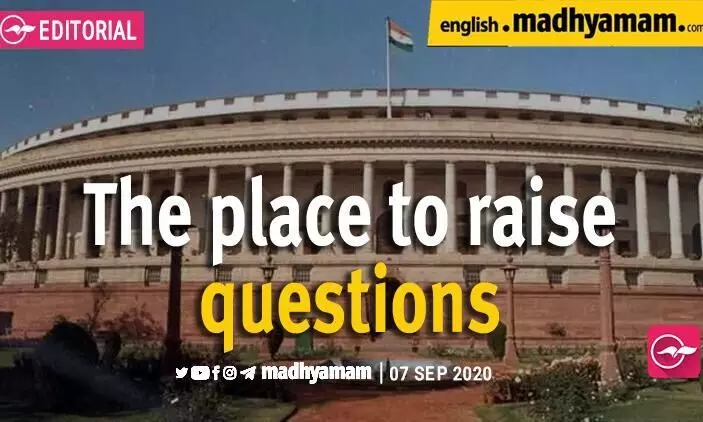
The place to raise questions
text_fieldsBy withdrawing the opportunity to raise questions in Parliament's monsoon session commencing on 14th of this month, the Centre has denied the right of people's representatives cardinal right to ask for accountability. Given the stipulation that questions should be submitted 15 days in advance, questions this time are in effect aborted prematurely. The reason cited for the decision is the risk of Covid. In addition to barring questions with notice, the zero hour for instant queries has also been curtailed to a mere 30 minutes. The step makes it plain that the government sees parliament only as a passive instrument for making laws of its liking and as a mere constitutional formality.
It is paradoxical that the same government is bent on conducting JEE-NEET entrance examinations adamantly on scheduled dates, without any regard for the Covid threat or the objections from students and the opposition. Governments are functioning as usual and in Bihar even the assembly election is going to be held. In Kerala, by-elections have been scheduled, in addition to upcoming local bodies poll. Markets are being opened and inter-state travel is also now allowed without hurdles. None of this has started because the Covid threat is over. When the country switches to a mode of living with Covid, all spheres of life are becoming scenes of a new normal. And all around, people are going about their activities by maintaining physical distance, wearing masks and observing other Covid protocols.
Not the least important among these is the right of legislators to ask questions and seek information. It is not to be dispensed with and if it is, as the government would like it to be, it amounts to denying the people the right to know about administrative actions and decisions. The silencing of MP's in this manner will bring down their public esteem besides wrecking the core of democracy. The question hour of parliament is a business that can be carried out in a much safer manner than scores of others that are happening smoothly with due observance of Covid protocol. Since questions will be received in advance, the presence of only those officials related to a question will be required at that time. It is a shame to argue that something that can be accomplished in other places, cannot be allowed to happen in parliament.
The crux of the matter is that the Modi government uses Covid as a cover to push its own questionable, and widely challenged, agenda. In the regime of BJP, which was very loquacious about transparency, the precedent of prime minister holding press meets disappeared. Dissemination of information from ministries came to an end. The media is in a situation of being forced to write news reports based on the Twitter account of ministers and the Mann ki Baat broadcast of the prime minister. That leaves no space to raise counter questions and seek clarification. To cap it all, the Right to Information (RTI) is being emaciated; the very post of Chief Information Commissioner has been lying vacant for a few years. Questions and complaints are piling up in this critical arm of a democratic government. The brute majority in parliament has given the government such a hegemony in legislative domain that it can become arbitrary and can weaken democracy.
Amidst all such dark factors, it was the question time and the zero hour that had remained as the narrow, bright window of right to information. At the same time when the government asserts that Covid is no obstacle at all for lakhs of students to turn up for and write examinations, in the name of the same Covid, it is disabling parliament, where it is quite easy to enforce Covid protocol. The truth of the matter is that there are quite many questions that the government fears people to be harbouring. The economy, which had crumbled following the note-ban and a distorted GST, is in dire straits. Gross Domestic Product (GDP) is at an all-time low. It has by now become quite obvious that one reason for the spread of the pandemic and the aggravation of resultant economic fallout, is the instant declaration of lockdown without any advance preparation whatsoever. On the international front, the border conflicts have laid bare the truth about the government's earlier claims. The encroachment on the rights and authorities of states has been crossing all boundaries. The Centre is going back on its promise to compensate states for GST revenue losses, and now says it is not bound to do it. The unaddressed criticism is that the Centre has not played any active role in preventing the pandemic. Serious doubts have been raised about the entirely opaque fund called PM-CARES, which is answerable to no one.
The people have their right to demand answers and they are entitled to know who are responsible for policy deficiencies. Thus the question hour is a shield of the people against the hegemonistic performance of the government. If the legislative houses are the core of democracy, it is its chief role to obtain answers by raising questions. Preventing that would constitute an insult to the people, for if they are not able to speak up and raise questions, democracy will be reduced to a farce.






















